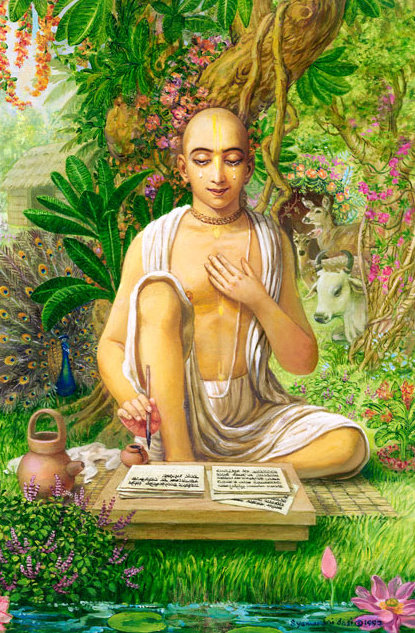(Srila Jiva Gosvami)
"Śrīla Jīva Gosvāmī, in order to please the Lord, later composed a grammar in Sanskrit, in which all the rules of grammar were explained with examples that used the holy names of the Lord. This grammar is still current. It is known as Hari-nāmāmṛta-vyākaraṇa and is prescribed in the syllabus of schools in Bengal."
(Śrīmad-Bhāgavatam, Introduction)
"According to Śrīla Jīva Gosvāmī's statement, in accordance with authoritative sources, Lord Kṛṣṇa is the source of all other incarnations. It is not that Lord Kṛṣṇa has any source of incarnation. All the symptoms of the Supreme Truth in full are present in the person of Lord Śrī Kṛṣṇa, and in the Bhagavad-gītā the Lord emphatically declares that there is no truth greater than or equal to Himself. In this stanza the word svayam is particularly mentioned to confirm that Lord Kṛṣṇa has no other source than Himself. Although in other places the incarnations are described as bhagavān because of their specific functions, nowhere are they declared to be the Supreme Personality. In this stanza the word svayam signifies the supremacy as the summum bonum."
(Śrīmad-Bhāgavatam 1.3.28, Purport)
"The first duty of a person in the renounced order of life is to contribute some literary work for the benefit of the human being in order to give him realized direction toward self-realization. Amongst the other duties in the renounced order of life of Śrīla Sanātana, Śrīla Rūpa and the other Gosvāmīs of Vṛndāvana, the foremost duty discharged by them was to hold learned discourses amongst themselves at Sevākuñja, Vṛndāvana (the spot where Śrī Rādhā-Dāmodara Temple was established by Śrīla Jīva Gosvāmī and where the actual samādhi tombs of Śrīla Rūpa Gosvāmī and Śrīla Jīva Gosvāmī are laid). For the benefit of all in human society, they left behind them immense literatures of transcendental importance."
(Śrīmad-Bhāgavatam 2.2.5, Purport)
"As already explained in the texts of Śrīmad-Bhāgavatam (First Canto), either direct bhakti-yoga or the means which ultimately culminate in bhakti-yoga, without any tinge of fruitive activity, constitutes the highest form of religion. Everything else is simply a waste of time for the performer.
Śrīla Śrīdhara Svāmī and all other ācāryas, like Jīva Gosvāmī, agree that bhakti-yoga is not only easy, simple, natural and free from trouble, but is the only source of happiness for the human being."
(Śrīmad-Bhāgavatam 2.2.33, Purport)
"The highest perfectional thinking for human society is suggested here by Śukadeva Gosvāmī, namely, sufficiently hearing Śrīmad-Bhāgavatam. For men in this age of Kali, when they have lost the perfect vision of life, this Śrīmad-Bhāgavatam is the torchlight by which to see the real path. Śrīla Jīva Gosvāmī Prabhupāda has commented on the kathāmṛtam mentioned in this verse and has indicated Śrīmad-Bhāgavatam to be the nectarean message of the Personality of Godhead. By sufficient hearing of Śrīmad-Bhāgavatam, the polluted aim of life, namely lording it over matter, will subside, and the people in general in all parts of the world will be able to live a peaceful life of knowledge and bliss."
(Śrīmad-Bhāgavatam 2.2.37, Purport)
"The Māyāvādī philosophers recommend merging in the impersonal effulgence of Brahman; that is their ultimate goal, or destination. That merging is also mentioned here. But in spite of merging, one can keep his individuality. The example given by Jīva Gosvāmī is that a green bird that enters a green tree appears to merge in the color of greenness, but actually the bird does not lose its individuality. Similarly, a living entity merged either in the material nature or in the spiritual nature does not give up his individuality. Real individuality is to understand oneself to be the eternal servitor of the Supreme Lord."
(Śrīmad-Bhāgavatam 3.27.14, Purport)
"In Kali-yuga the Vedic ritualistic ceremonies cannot be performed as perfectly as before. Therefore Śrīla Jīva Gosvāmī has recommended that although one should take care to follow all the principles in every kind of spiritual activity, especially in worship of the Deity, there is still a chance of discrepancies, and one should compensate for this by chanting the holy name of the Supreme Personality of Godhead. In our Kṛṣṇa consciousness movement we therefore give special stress to the chanting of the Hare Kṛṣṇa mantra in all activities."
(Śrīmad-Bhāgavatam 8.23.16, Purport)
"The service of the spiritual master is essential. If there is no chance to serve the spiritual master directly, a devotee should serve him by remembering his instructions. There is no difference between the spiritual master’s instructions and the spiritual master himself. In his absence, therefore, his words of direction should be the pride of the disciple. If one thinks that he is above consulting anyone else, including a spiritual master, he is at once an offender at the lotus feet of the Lord. Such an offender can never go back to Godhead. It is imperative that a serious person accept a bona fide spiritual master in terms of the śāstric injunctions. Śrī Jīva Gosvāmī advises that one not accept a spiritual master in terms of hereditary or customary social and ecclesiastical conventions. One should simply try to find a genuinely qualified spiritual master for actual advancement in spiritual understanding."
(Caitanya-caritāmṛta Ādi 1.35, Purport)
"The principle of very rigidly carrying out the order of the spiritual master must be observed. The spiritual master gives different orders to different people. For example, Śrī Caitanya Mahāprabhu ordered Jīva Gosvāmī, Rūpa Gosvāmī and Sanātana Gosvāmī to preach, and He ordered Raghunātha dāsa Gosvāmī to strictly follow the rules and regulations of the renounced order. All six Gosvāmīs strictly followed the instructions of Śrī Caitanya Mahāprabhu. This is the principle for progress in devotional service. After receiving an order from the spiritual master, one must strictly try to execute the order. That is the way of success."
(Caitanya-caritāmṛta Antya 6.312, Purport)
.

